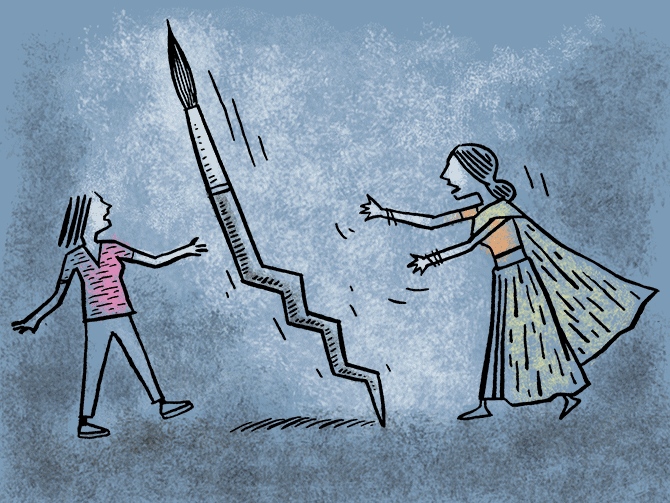 | « Back to article | Print this article |
'Whether she pursued academics or art, there was one sort of tyranny she'd probably never escape -- her father's,' says Geetanjali Krishna.
Illustration: Dominic Xavier/Rediff.com

"My wife had to give our 15-year-old daughter a beating today," said Mahinder Singh glumly.
"Punishment is necessary, I know, but it never feels good to a parent, even though we know it's for her own good."
Whatever she might've done, I said, surely beating was not the best solution?
It turned out that the teenager had been punished for scoring 88 per cent in her Class 10 board exams.
Such high marks deserved reward, not punishment, I commented.
Singh didn't think so.
His brother's son had stood first in the school with 98 per cent. Those were the academic outcomes to strive for.
"After all, I'm a driver with meagre savings," he said.
"The child has to do well academically, get a good job and save for her marriage, too."
As he was talking, a thought struck me.
The board exam results had come out a month ago. Why were they punishing their daughter for her performance now?
It turned out that they had found their daughter painting.
"As a child she love to doodle and we didn't mind her doing so as it kept her out of trouble," Singh said.
Apparently, as she grew older, her work improved. So much so that the stationer from whom she bought her paints often bought her artworks for Rs 200 to Rs 300.
"However, last year, when she came to Class 10, we told her to stop wasting her time on artistic pursuits," he said. "We felt she needed to focus all her time on studying."
This year, Singh and his wife had counselled their daughter to opt for the commerce stream, as they felt it opened up the best job prospects later.
"When we found her painting instead of practising maths or accounts, we had no option but to punish her," he said.
As the parent of a child of a similar age whose greatest pleasure is to muck about with paints, his story appalled me.
However, instead of saying so (and running the risk of alienating him) I decided to try a different tack.
If the girl succeeded as an artist, I pointed out, they might never need to worry about their finances.
Even if she didn't, there was a whole range of lucrative jobs today that required artistic ability.
A talent for art opened up job possibilities in Web design, computer-aided design, designing publicity materials and so much more.
I told Singh that, only recently, I had worked with a college student/freelance designer to create a brochure for an NGO.
While studying, he took on such assignments and was able to earn much more than pocket money on a monthly basis.
Clearly, I had given Singh some food for thought.
"Maybe, I should tell my daughter that she can paint -- as long as she buys her supplies from the money she earns selling her paintings to the stationer," he mused.
"Maybe that will push her to sell at least one artwork every week."
Then his musings became more ambitious. "I could ask her to make a collection of religious paintings for the festive season ahead... Lakshmi-Ganesh paintings would sell like hot cakes and she could make a lot of money," he said.
As he went off to give his daughter the good news that he was inclined to let her paint after all, I mused that perhaps she was going to exchange the pressure of scoring well in school for the oppressiveness of painting saleable art.
Who can say which would turn out to be worse?
Then a sobering thought struck -- whether she pursued academics or art, there was one sort of tyranny she'd probably never escape -- her father's.